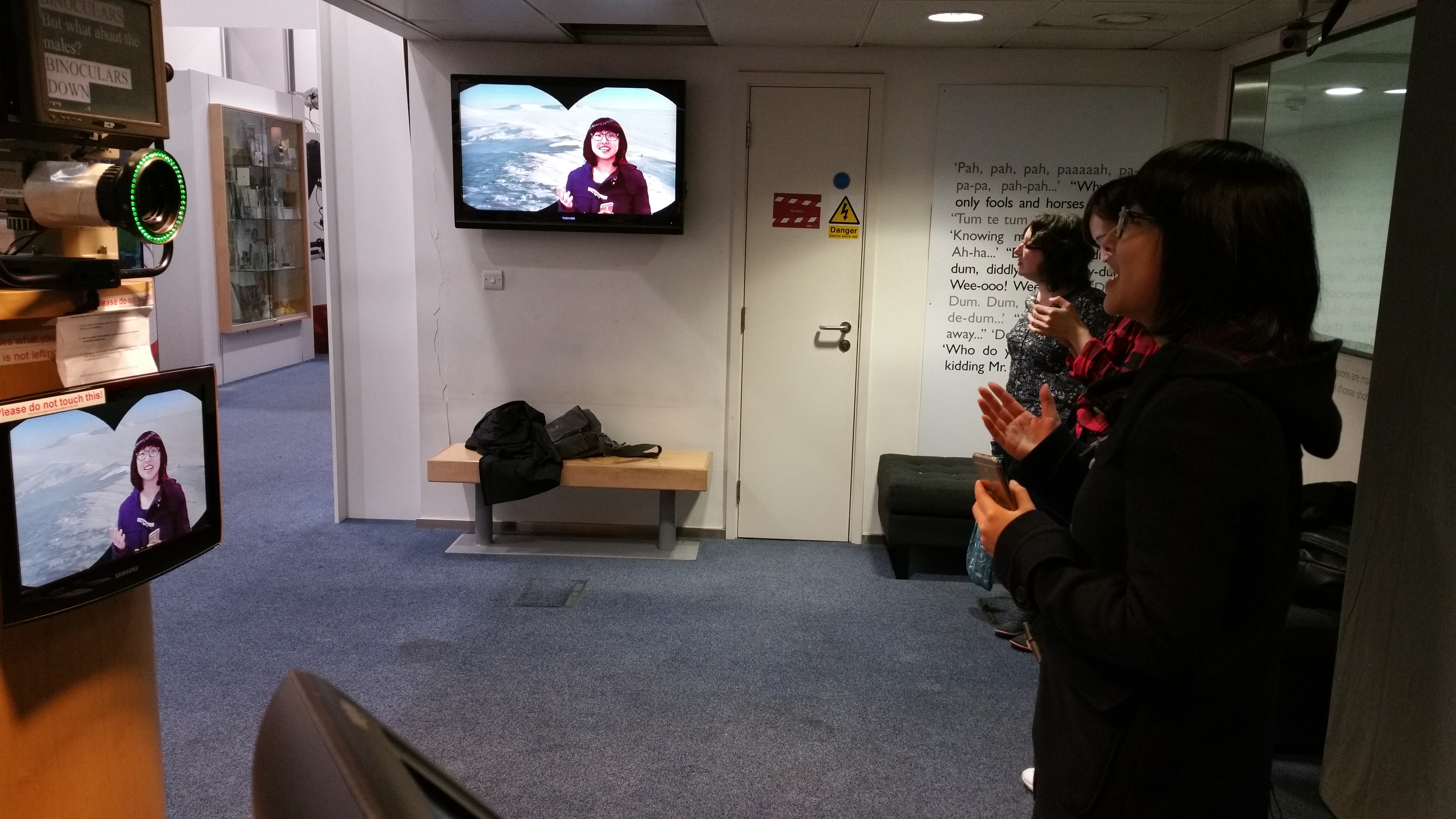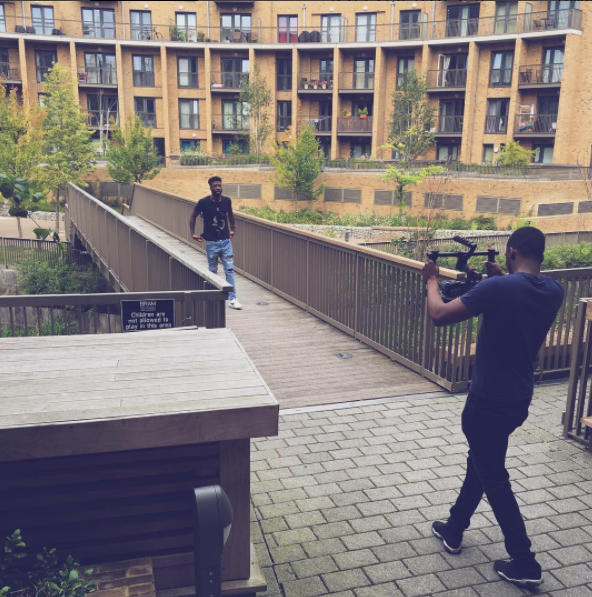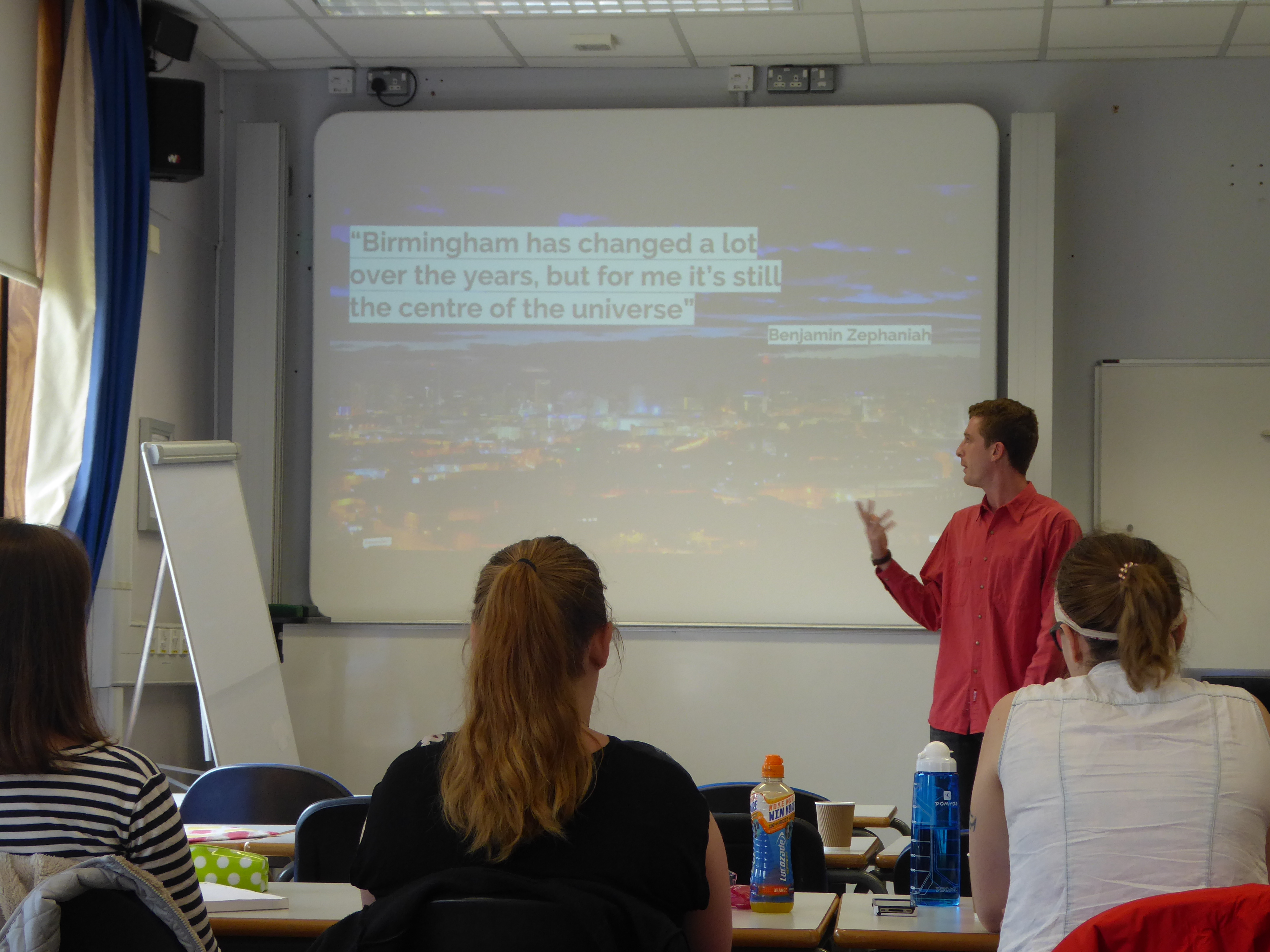On Thursday 17th March, four FTV students attended workshops at BBC Birmingham as part of Digital Cities Week to pick the brains of broadcast industry insiders and participate in practical training with digital tools. In this post, Elena Tang and Yang Zhang reflect on digital storytelling, using new technologies to produce innovative content, and trying their hands at being weather presenters.
We were welcomed to the Mailbox with a 3D goggles show-zone and offered a chance to get immersed in this new interactive way to engage in previously 2D television programmes. After registering, we were led upstairs and through labyrinth-like alleys and finally arrived at the BBC Academy space where the workshops were mainly held.
Digital Storytelling
The first session was hosted by writer Elaine Wilson. She explained how digital storytelling is different and what types of stories you can tell online. With the development of technology, the way to tell a story has changed dramatically and it is obvious that many people prefer accessing content through mobile phones, laptops and other electronic devices rather than books and newspapers. Thus, digital platforms play a significant role in filmmaking and television production. After a brief introduction to the core points for a good story, Elaine suggested ways to take full advantage of social media in storytelling. Examples of short form vloggers like ‘MinutePhysics’ were also shown to demonstrate how effectively this type of content works.
We learned that a good character in a story should have a clear goal and motivation, being recognizable while having their own flaws and strengths. Critical elements of a story include consistency and consequence: what happens if the characters succeed or fail. During an activity we were divided into groups of four and given a nursery rhyme to adapt into stories to be told in digital forms. Everyone’s ideas seemed so unique and innovative, and it was great to see that people’s creativity could be ignited through simple inspirations like the owl and the pussy-cat falling in love with each other.
Next, in order to put the idea into practice, we were tasked with making a 10-second short film using Vine in a limited time. We grabbed the chance to make creative videos in small groups, and all videos produced were posted onto the big screen so everyone gets to see what the other groups had made: some hilarious, some very artistic, and many with innovative twists. The fun and relaxed activity helped us learn the art of digital platforms and see how swiftly a piece can be produced.
Hands-on Technology
During the lunch break we explored the BBC Public Space where we were able to try working as an anchor on either a weather forecast, the news or a natural history program. Reading the autocue was quite a challenge, but it was fun to see ourselves on screen on the hunt for polar bears or predicting rain, and we got a better understanding of how a
 presenter works.
presenter works.
In the afternoon session, we attended different workshops in smaller groups and tried making short form content with infographics, photos and audio using iPad and mobile apps like Splice and Pictophile Pro. We got to experience digital content including Pint-sized Ashes for BBC Radio 5 Live, facilities including green screen, 360º video and VR headset, all within 10 minute workshops.
The intense but fun workshops showed us how interesting and seemingly complex digital content can be produced in a short period of time with limited resources and on a small budget, especially using simple mobile apps. The future of creative media is indeed in the hands of everyone.
Elena Tang and Yang Zhang
If you’d like to learn more about Digital Storytelling, sign up by 30 May for a free course with the University of Birmingham, BBC Academy and Creative Skillset to access a wealth of tips and resources: https://www.futurelearn.com/courses/digital-storytelling



 Lou managed to cover the whole of the fourth floor with glitter, Christos had butter fingers, Frida gave us all diabetes, Zoe made an unplugged hard drive seem like the end of the world, Cheryl was ‘stupid’ (or maybe she’s just kidding us to hide her editing prowess), Claire managed to exist about 20 minutes behind the rest of the universe, Sofia enchanted us with her colourful language, Jenny made putting up a tripod in record time look like a matter of life or death, Jack was LOUD, Sam lost all his hair, Hermione got beautifully lit selfies, Black Market Beth managed to run her own DVD business on the side, our wonderful international students joined in with our terrible British banter and discovered the joy of Christmas crackers, Rayna gave birth to a whole other human and still made classes, Techy Tash impressed with her audio skills, Lorhren started off looking terrified but showed us her creativity producing an amazing visualisation film
Lou managed to cover the whole of the fourth floor with glitter, Christos had butter fingers, Frida gave us all diabetes, Zoe made an unplugged hard drive seem like the end of the world, Cheryl was ‘stupid’ (or maybe she’s just kidding us to hide her editing prowess), Claire managed to exist about 20 minutes behind the rest of the universe, Sofia enchanted us with her colourful language, Jenny made putting up a tripod in record time look like a matter of life or death, Jack was LOUD, Sam lost all his hair, Hermione got beautifully lit selfies, Black Market Beth managed to run her own DVD business on the side, our wonderful international students joined in with our terrible British banter and discovered the joy of Christmas crackers, Rayna gave birth to a whole other human and still made classes, Techy Tash impressed with her audio skills, Lorhren started off looking terrified but showed us her creativity producing an amazing visualisation film  with Hatty (starring Christos as Salvador Dali – nice wink), I finally worked out who was Heather and who was Helena after 11 weeks, Shereen’s fashion sense put us all to shame (seriously though, how did you get so cool?) and we all survived the terrible Scandinavian sweet challenge.
with Hatty (starring Christos as Salvador Dali – nice wink), I finally worked out who was Heather and who was Helena after 11 weeks, Shereen’s fashion sense put us all to shame (seriously though, how did you get so cool?) and we all survived the terrible Scandinavian sweet challenge.
 Instagram is a social media platform that filmmakers and photographers can use to promote their work and get it seen by people from all over the world. As an aspiring filmmaker I began watching various YouTube videos on how to effectively promote your work and gain followers and discovered that Instagram was one way forward. I’ve always had a love for music so decided to learn how to create music videos in the most cinematic way possible and then promote them on social media.
Instagram is a social media platform that filmmakers and photographers can use to promote their work and get it seen by people from all over the world. As an aspiring filmmaker I began watching various YouTube videos on how to effectively promote your work and gain followers and discovered that Instagram was one way forward. I’ve always had a love for music so decided to learn how to create music videos in the most cinematic way possible and then promote them on social media.
 e I’ve been consistent with the work I post. It may not be a massive amount, but slow progress is better than no progress.
e I’ve been consistent with the work I post. It may not be a massive amount, but slow progress is better than no progress.

 Taking place in Week 1, on Friday 30th September 2016, Professor Shannon met with all the students inside Birmingham New Street train station at 1pm. He provided us with introductory leaflets about the city’s media and arts before explaining where we’d be visiting on the scheduled tour: the famous Electric Cinema, BBC Birmingham, Everyman Cinema, the Ikon Gallery and local chains at Cineworld and Odeon.
Taking place in Week 1, on Friday 30th September 2016, Professor Shannon met with all the students inside Birmingham New Street train station at 1pm. He provided us with introductory leaflets about the city’s media and arts before explaining where we’d be visiting on the scheduled tour: the famous Electric Cinema, BBC Birmingham, Everyman Cinema, the Ikon Gallery and local chains at Cineworld and Odeon. We then began our stroll through the city centre before eventually passing through the Mailbox and finding the current offices at BBC Birmingham. After another group photo, Roger guided us inside and we lovingly observed BBC sets and props of its famous TV shows, including costumes from Peaky Blinders. We also had some fun with the BBC Weather equipment.
We then began our stroll through the city centre before eventually passing through the Mailbox and finding the current offices at BBC Birmingham. After another group photo, Roger guided us inside and we lovingly observed BBC sets and props of its famous TV shows, including costumes from Peaky Blinders. We also had some fun with the BBC Weather equipment.

 presenter works.
presenter works.